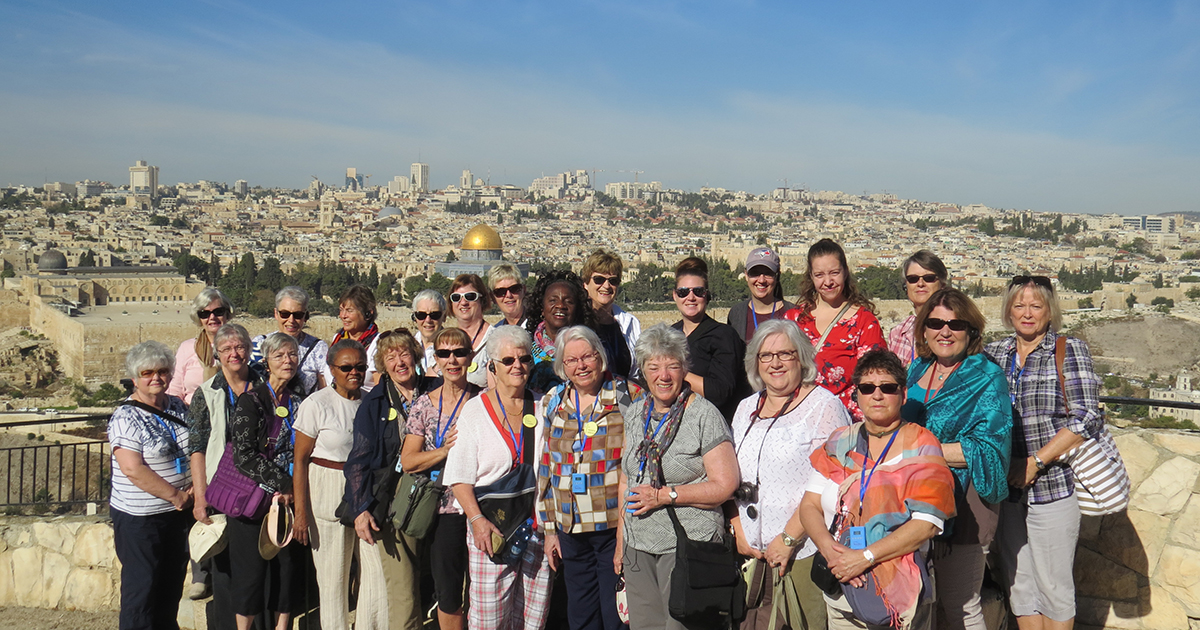This year’s Jerusalem Sunday celebration falls on Mother’s Day, and that convergence has not gone unnoticed by the Canadian Companions of the Diocese of Jerusalem (CCDJ).
The board of the CCDJ has chosen the theme Mothers of Jerusalem for the fifth annual Jerusalem Sunday, which parishes and diocese will celebrate on May 13. Resources are available online to help Anglicans mark the occasion, which focuses on the ministry of women and the work of mothers in striving for peace and justice.
Bishop Michael Ingham (ret’d), who serves on the advisory council to the CCDJ, said that the ministry of women is “quite important” in the Episcopal Diocese of Jerusalem.
“It’s a culture and a society where traditionally, men dominate,” Ingham said. “So the empowerment of women, and releasing the talents and creativity of women, is really the focus this year, and the diocese is working hard on that.”
He praised the role of Shafeeqa Dawani, wife of Bishop Suheil Dawani, as a leader in the diocese “particularly empowering the ministry of women and young women in a culture which tends to suppress them.”
Liturgical and preaching resources for Jerusalem Sunday 2018 were compiled and written by Dr. Patricia Bays, a retired teacher and author of the book This Anglican Church of Ours.
Many of the resources draw upon the theme of pilgrimage. In 2016 Bays took part in a women’s pilgrimage to Jerusalem, during which she met with fellow Anglicans in Israel-Palestine that included local women’s groups.
Another contributor to this years’ resources, the Rev. Canon Dr. Dawna Wall, took part in her own pilgrimage to Jerusalem and has written three reflections on the theme Mothers of Jerusalem, which are included among the preaching resources.
“There are a number of psalms and other passages that relate to pilgrimage,” Bays said. “It could be about Jerusalem itself, the image of Jerusalem in the Book of Revelation as a city of peace.
“I looked at the idea of mothers of Jerusalem, and the image of mother hen; Jesus talks about himself as [a] mother hen as he looks at the city of Jerusalem […] And then I also provided some background information about the diocese today—the membership of the diocese, a bit of the history, and some of the work of women in the diocese.”
Other resources include suggestions for hymns and prayers of the people.
The meaning of Jerusalem Sunday
Since the General Synod of the Anglican Church of Canada established Jerusalem Sunday in 2013 at the suggestion of Archbishop and Primate Fred Hiltz, the occasion has slowly grown in prominence. Yet, Ingham suggested that Jerusalem Sunday remains “somewhat off the radar” for many Canadian Anglicans—a reflection, he said, of current challenges faced by the Canadian church in a situation “when there are many worthy causes to support, and many local parish churches are struggling to fund their own ministries.”
Even so, Ingham said that the Anglican Church of Canada’s annual reflection on its relationship with the Diocese of Jerusalem connects Canadian Anglicans with some of the deepest roots of the Christian tradition.
“Jerusalem is in many ways the crossroads of the world,” Ingham said. “It’s where civilizations have met and clashed over centuries. It’s the place where the three Abrahamic religions meet. It’s the place, geopolitically, which could ignite the whole world in war. And spiritually, for all Christians, it’s the place where we all feel we have a connection, because of [its status as] the land of Jesus’s birth and death and resurrection.
“To be connected to Jerusalem is in a real sense to be connected with the living heart of our Christian faith. At a time when Christians are depopulating in the Middle East, the land of our Lord’s life and death is in the hands of the Diocese of Jerusalem and other partner churches in that area—all of which are facing grave difficulties.”
Most urgent among these difficulties is the need for financial support to fund the diocese in its various ministries.
The Diocese of Jerusalem is spread out over five different countries or territories: Lebanon, Syria, Jordan, Israel, and the Palestinian territories. It oversees more than 50 institutions that include parish churches, hospitals, clinics, and schools that reach beyond local Christians and also serve much of the region’s largely Muslim population.
While the CCDJ advisory council hopes Canadian Anglicans will send prayers and raise awareness on Jerusalem Sunday, they also hope collections will be able to send some material help to the diocese.
“It’s a very selfless outreach ministry that the diocese conducts, in extraordinarily difficult circumstances,” Ingham said. “We all know about the geopolitical tensions in the area. The church is one of the forces in the Middle East that attempts to lower the temperature of war and draw people together in relationships of mutual respect and trust and peace, and it’s very difficult to do that.”
Bays underscored the need to pray for peace and for the church to give strength to its Christian brothers and sisters in Jerusalem.
“We tend to think of Israel as primarily Jewish or primarily Muslim, but there’s quite a significant and important Christian presence there who have been in that land from the very beginning of the Christian church,” she said. “I think that’s probably little-known in the Anglican Church, and I think it’s important to celebrate.”
View a complete list of resources for Jerusalem Sunday.
Learn how to become a Companion of Jerusalem.
Help support the Diocese of Jerusalem in its ministries.
Interested in keeping up-to-date on news, opinion, events and resources from the Anglican Church of Canada? Sign up for our email alerts .

